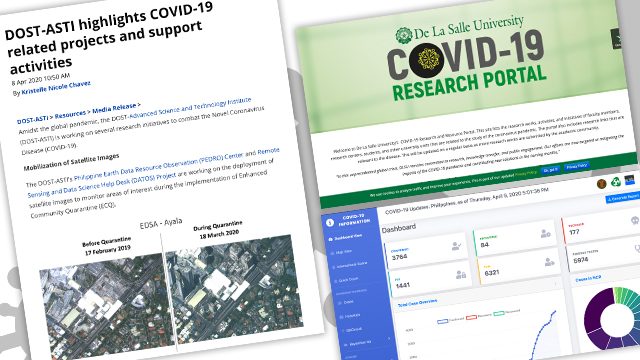SUMMARY
This is AI generated summarization, which may have errors. For context, always refer to the full article.

As another week passes in the Philippines’ lockdown to fight the coronavirus, it seems prudent to highlight some of the things being done by Philippine tech companies and organizations to help people get by.
From providing tangible assistance to frontliners to simple, yet important actions like tech support for research initiatives, here’s a list of the things being done by the local tech scene in this crazy world we live in today.
DOST initiatives
The Department of Science and Technology (DOST) has been out and about prepping some 500,000 face masks for the public, and is working to produce 5,000 face shields daily for medical professionals working on the front lines.
Meanwhile, the government is using a QR system developed by Philippine IT professionals to speed up the passage of frontliners at checkpoints. This RapidPassPH system – commissioned by the DOST – rolled out on Monday, April 6, aiming to remove congestion, speed up deliveries, and protect checkpoint frontliners by lessening personal contact with commuters passing through.
There are other research-related initiatives in place as well, as announced by the DOST on April 8.
DOST’s Advanced Science and Technology Institute (DOST-ASTI) is working on monitoring areas of interest by using satellite imaging to compare locations in pre-quarantine conditions to the present.
The DOST-ASTI’s Computing and Archiving Research Environment (COARE) Facility is also hosting the computational needs of the The Philippine Genome Center – Core Facility for Bioinformatics (PGC-CFB) as it tries to crowdsource implementation of some computational studies related to COVID-19.
DOST-ASTI is also working on developing contactless temperature-taking devices for frontliners which use medical grade sensors.
It’s also helping in distributed computing, by allocating a portion of its high-performance computing resources to the current COVID-19 research of Folding@Home.
In line with helping out those working on the “Feasibility Analysis of Syndromic Surveillance Using Spatio-Temporal Epidemiological Modeler for Early Detection of Diseases (FASSSTER)” project – a forecasting tool used to create data-based forecasts for the severity of coronavirus infection rates in the country – the DOST is also providing assistance. It is giving the FASSSTER team access to a satellite image archive and a provision of virtual servers, among other bits of support. This project is led by the Ateneo de Manila University and funded by the Philippine Council for Health Research and Development (DOST-PCHRD). (READ: Coronavirus can go from 1.5M to 15,000 cases with better testing – forecasting tool)
Helping out in other ways
Leading the way is UP, which has been developing one of the most important tools in the fight against the virus: test kits. Their test kits are capable of putting out results in the 2 hours, and at P1300 per kit, is 6 times cheaper than its foreign counterpart that costs P8,500.
De La Salle University, for example, launched a web portal featuring COVID-19-related research works, activities, and initiatives of faculty members, research centers, students, and other university units. It’s still a little bare, seeing as people are still working on understanding COVID-19, but it does provide direction for the future.
Google Maps has been updated locally to provide information on the Department of Transportation’s (DOTr) free hospital shuttle services.
The University of the Philippines set up a chat bot to help people seeking support or information on the coronavirus so they can get the information they need. The bot can be found on Facebook Messenger and is integrated into https://endcov.ph as a support system.
There are also a number of apps out that aim to help you determine if you need to be tested for the coronavirus disease COVID-19. To wit, there’s FightCovid.app and ENDCov. My personal inclination, however, is more COVID-19 testing should be done regardless of whatever an app might tell you about your health status at this time, but that’s just me.
Aside from these two, also in development are EDDIE, an emergency dispatcher app that hopes to provide a place for various groups to request for basic supplies and needs, and SINAT, or the Smart, Intuitive, Non-contact Assessment and Triaging app – a thermal scanning system being developed by a group of volunteers. (READ: 3 Filipino-made medical apps to help combat coronavirus)
Contact tracing platforms have also been launched in the form StaySafe.ph, and another app in Cebu. The National Privacy Commission, meanwhile, has been keeping an eye on possible breaches to individual privacy in light of the data collection that may transpire during the crisis.
Private firms Globe and PLDT have been providing free WiFi in hospitals and other health care locations, amongst other contributions to the fight.
All in all, it’s a pretty good list of things being done to try and help. Of course, some other major companies, including internet service providers and video streaming services, are also doing their part to keep the internet up while more people are using it to stave off boredom.
I salute all of them, even if only from behind a virtual screen. Mitigate your risks, get help if you need it, and let’s all get through this together. – Rappler.com
Fight the coronavirus by taking care of yourself and purchasing your pandemic essentials using this Shopee voucher code!
Add a comment
How does this make you feel?
There are no comments yet. Add your comment to start the conversation.